8 WooCommerce alternatives to sell online
WooCommerce is a widely used platform for building online stores worldwide. However, it may not be suitable for all types of businesses.
In this article, we’ll explore eight WooCommerce alternatives for various businesses of all sizes. This list includes other eCommerce WordPress plugins and software-as-a-service (SaaS) platforms.
We’ll also explain when to consider a WooCommerce alternative and how to choose the most suitable one for your business.
8 best WooCommerce alternatives
Let’s review the best WooCommerce alternatives to compare their notable eCommerce features, payment integrations, pros and cons, and pricing plans.
1. Easy Digital Downloads
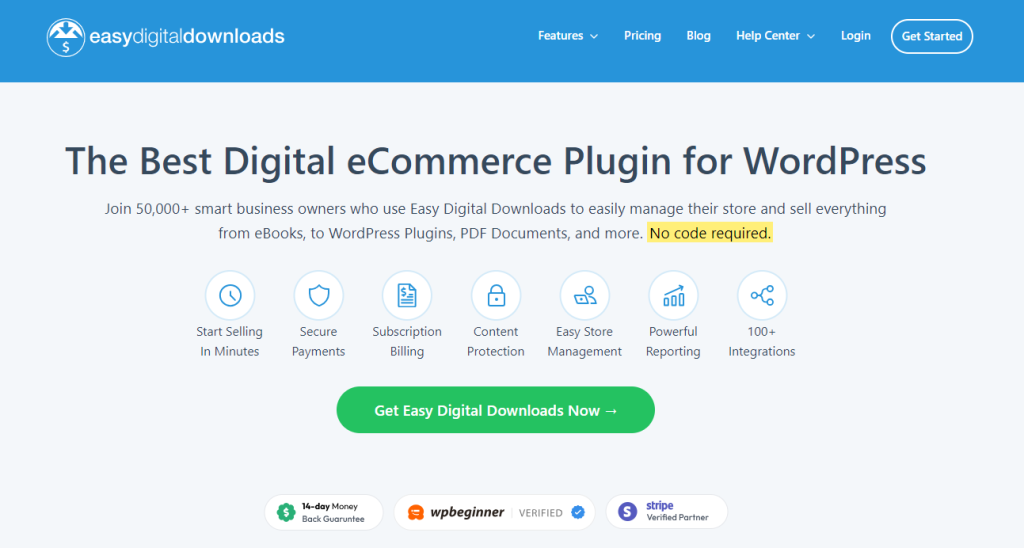
Easy Digital Downloads is one of the best WooCommerce alternatives for WordPress websites. It lets you sell digital products such as music, videos, eBooks, themes, and software.
While you can also sell digital products in WooCommerce, Easy Digital Downloads offers specialized features, so you don’t have to install multiple extensions.
With this plugin, you can create multiple product types, such as a single item, a bundle, or a service. It provides different pricing options, including subscriptions, bundled pricing, and pay-as-you-wish for selling multiple product variations.
Furthermore, Easy Digital Downloads includes useful eCommerce blocks and widgets, including download buttons, products, shopping carts, and login forms.
You will also get a built-in analytics report that’s accessible from the WordPress dashboard. It tracks various business performance metrics, such as earnings, number of downloads, and website traffic.
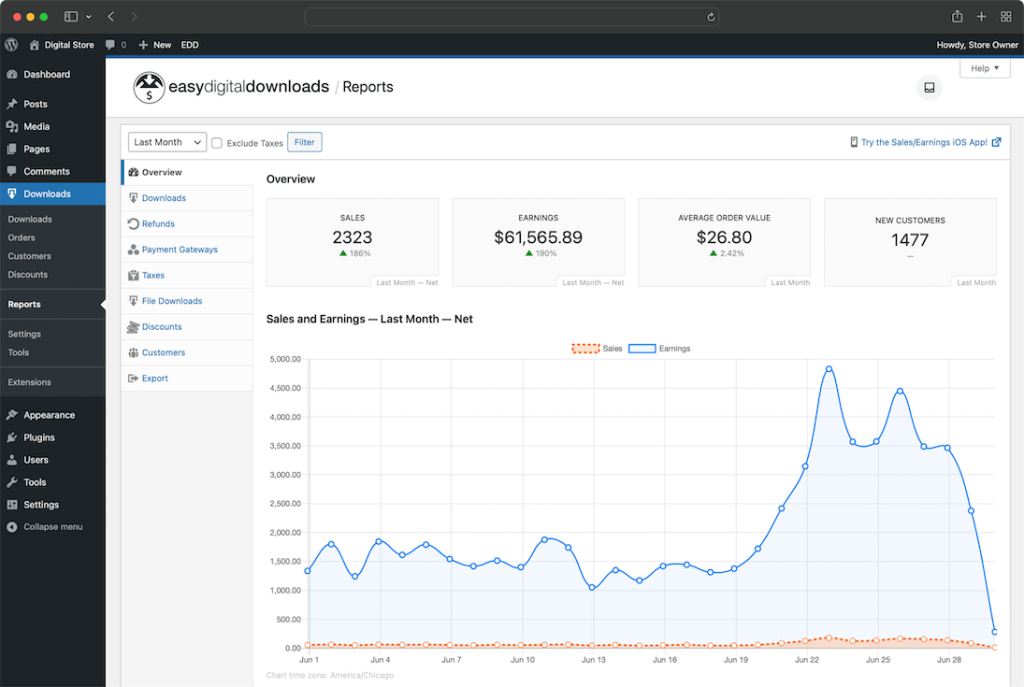
The customer management feature lets you track customers’ purchase history, making it easier to do targeted marketing for future product releases.
Easy Digital Downloads supports 13 payment providers, including Stripe and PayPal. The plugin doesn’t charge additional transaction fees, so you only need to pay the fee from your chosen payment gateway.
You can integrate additional payment gateways as well as sales and marketing features by installing various extensions.
Price
Easy Digital Downloads offers free and premium versions. The free plan is enough to power a small store, making it a great choice for earning money online.
Once you want to scale your business, you can choose from four premium plans, with prices ranging from $89.55 to $349.65/year.
With the paid plans, you can upload unlimited files, sell products in subscriptions, unlock membership functionality, integrate up to 21 app extensions, access customer support, and more.
You can try the premium features by taking advantage of its 14-day money-back guarantee.
Pros
- Recurring subscription payment. With Easy Digital Downloads, you can sell digital products in a subscription model.
- Customer management panel. Easy Digital Downloads tracks consumer purchase history in the management panel to help improve your targeted marketing strategy.
- Simple refund management. You can manage full and partial refunds directly from your WordPress dashboard.
Cons
- Limited to selling digital products. However, you can sell some physical products with an add-on.
- Premium extensions. You need to purchase the pro version to integrate features like email marketing, analytics, and contact form creation.
2. MemberPress
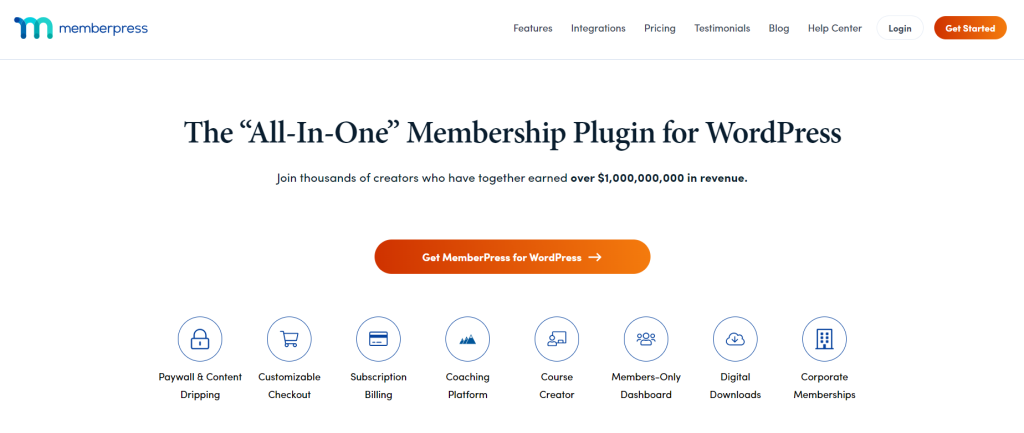
MemberPress is a membership WordPress plugin perfect for selling online courses or starting a coaching business. With this plugin, you can tailor any membership level without limitations.
If you use WooCommerce, you’ll need an extension to integrate this functionality because it’s not built into the default plugin.
In terms of website design, MemberPress provides built-in custom post types for creating pages, including pricing, registration, and courses. If you’re familiar with CSS, you can also tweak the style or create your own page template.
As for member access restriction, MemberPress’s content-dripping feature lets you release protected content in batches at scheduled times. If you set an expiration date for your content, even paying subscribers will not be able to see it anymore.
Furthermore, MemberPress lets you freely customize subscription payment plans. You can charge one-time or recurring fees and offer a free trial period.
There’s also an automated billing system to remind users to renew their memberships. Meanwhile, the automated PDF invoicing feature helps create a professional impression of your business.
MemberPress accepts integration with Stripe, PayPal, and Authorize.net to receive payments. It does not charge additional transaction fees.
Like WooCommerce, MemberPress has a library of add-ons to extend your membership site’s functionality. For instance, you can integrate the Easy Affiliate plugin to boost your business’ marketing efforts through affiliate partners.
Moreover, various extensions allow you to create specific membership website types, such as online courses, coaching businesses, and podcast memberships.
Price
MemberPress is a premium plugin with three pricing plans, ranging from $179.50 to $399.50/year. With these plans, you’ll get access to the plugin’s customer support team. However, your chosen plan determines the priority level of support you’ll receive.
Unless you want to sell podcast memberships or host audio and video content on Amazon Web Services, the Basic plan provides all the features you need to build a decent membership website.
Take advantage of its 14-day money-back guarantee to see if the plugin fits your business needs.
Pros
- Advanced membership access control. MemberPress offers unlimited access control to define user access levels and content restrictions.
- Content scheduling feature. You can release paid content in batches according to the schedule you set.
- Membership-specific extensions. MemberPress provides various add-ons for specific membership types. For instance, you can integrate Blubrry to create a paid podcast subscription.
Cons
- No free plan. You’ll need to pay a subscription fee to use the MemberPress plugin.
- No 24/7 customer support. MemberPress’s support team is only responsive during weekdays.
3. WP EasyCart
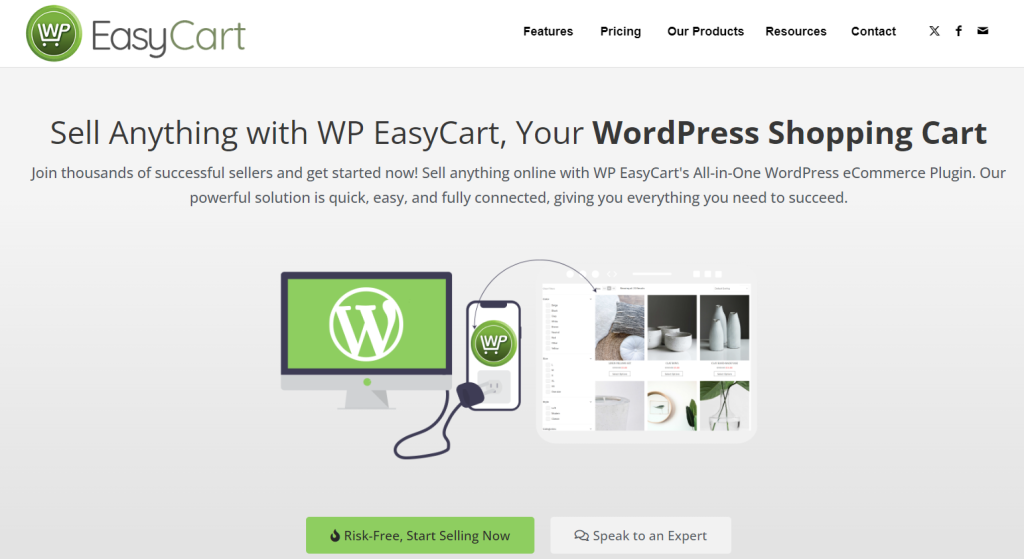
WP EasyCart is an all-in-one solution for building a WordPress eCommerce store. It’s similar to WooCommerce but focuses more on core eCommerce functionalities, making it suitable for small businesses with simple product listings.
This plugin supports multiple product types, such as physical products, digital downloadable items, gift cards, donations, services, subscriptions, and memberships.
Adding new product entries with WP EasyCart is simple via the sidebar pop-up. Moreover, managing your products is simple with the bulk action feature, which lets you delete, show, or hide up to 500 items in one go.
This plugin also provides a detailed analytics dashboard showing quick sales stats. You can track orders, all pending product reviews from customers, and total customer values from a single dashboard. To organize your business’s financial reports neatly, WP EasyCart lets you export selected data into a CSV file.
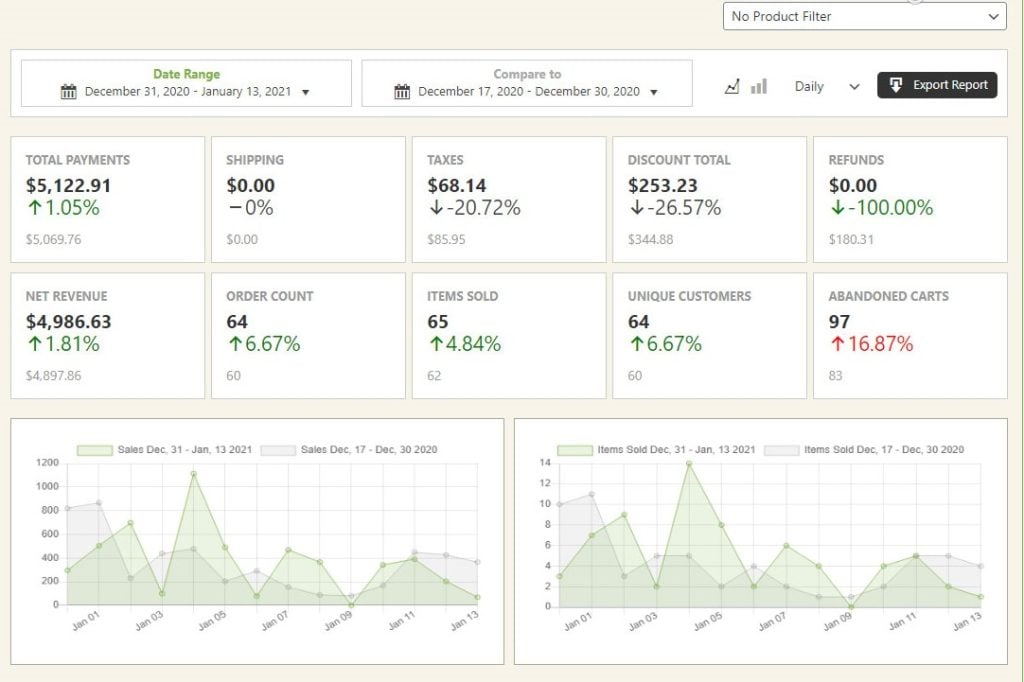
This plugin can boost your marketing efforts with a built-in abandoned cart feature to remind customers to finish their purchases. Moreover, it has promotional discounts and coupon functionalities to help you gain more profit through seasonal marketing campaigns.
To receive online payments, WP EasyCart lets you connect with over 30 popular payment gateways, including Square, Stripe, and PayPal. If you subscribe to one of the paid plans, you will not be charged an additional transaction fee.
Price
WP EasyCart offers a free plan with limited features. You can only sell retail products and accept payments through Stripe, PayPal, and Square, with an additional 2% platform fee.
To unlock more features, remove the additional transaction fee, and get unlimited customer support requests, upgrade to the Pro or Premium plan, which costs $69 and $89/year, respectively.
If you’re not satisfied with the features, there’s a 14-day money-back guarantee that you can claim.
Pros
- Quick setup. WP EasyCart has a more straightforward setup process than WooCommerce.
- Lightweight. Due to its simpler feature set, WP EasyCart has a smaller impact on website performance than WooCommerce.
- Store management accessibility. The Premium plan allows you to manage your store inventory via desktop and mobile apps.
Cons
- Additional transaction fee. WP EasyCart charges a 2% transaction fee if you use the free plan.
- Limited scaling options. Compared to WooCommerce, WP EasyCart lacks advanced customization possibilities.
4. Hostinger Online Store Builder

If you prioritize ease of use when choosing a WooCommerce alternative, Hostinger eCommerce Website Builder is a feature-rich yet beginner-friendly option.
It features an AI Builder that lets you create a custom online store in no time. The process is simple – describe your business in a few sentences, choose your preferred design style and colors, edit your website content, and publish.
Alternatively, you can choose from 150 customizable templates as the design foundation.
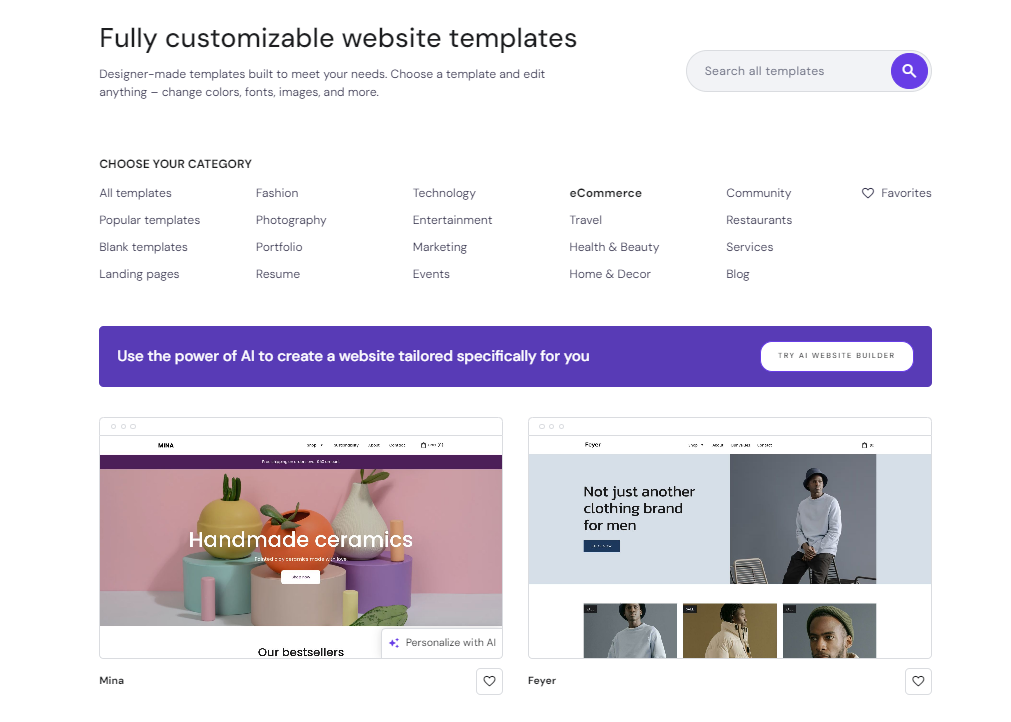
You can create digital and physical product listings or import an existing CSV file to your site. The builder’s AI features can also streamline the process of adding products – simply upload your product image, and the AI will write you a description that you can edit further.
This eCommerce website builder supports PayPal and Stripe for online payment integrations. If you reside in Brazil, Mexico, Colombia, or Argentina, you can connect with dLocal Go to accept payments. A manual or offline payment method is also available.
To boost your marketing efforts, Hostinger Website Builder provides integrations to third-party apps, including Google Analytics to gain insights into your target audience, Hotjar to analyze your customers’ behavior, Facebook Pixel for targeted marketing, and WhatsApp for easily connecting with your customers.
Furthermore, you can use the built-in AI-powered SEO tools to write meta titles, meta descriptions, and clean URLs for each web page on your site. A built-in blogging feature is also available to support your content marketing strategy.
Price
Hostinger Website Builder is a hosted platform, so you’ll get it bundled with a Hostinger hosting plan. The most popular option to kickstart an online store is the Business plan, which starts at £3.79/month.
As your business grows, you can upgrade to the Commerce plan at £7.99/month. It has more server resources to display more products and handle high website traffic.
Hostinger’s online store website builder doesn’t charge additional transaction fees. You only need to cover the charge from your chosen payment processor so you can maximize your business profit.
On top of that, every Hostinger Website Builder plan comes with a free domain name, website templates, 24/7 customer support, and a 30-day money-back guarantee.
Pros
- Built-in blogging feature. You can quickly develop your content marketing strategy through blog post writing.
- Plenty of AI-powered tools. The AI Builder can build a complete eCommerce site with custom images, text, and product placeholders. Other AI tools, including the AI Logo Maker, AI Writer, AI Heatmap, and AI SEO Assistant, can streamline your website-building tasks.
- No transaction fees. Hostinger Website Builder does not charge additional transaction fees.
Cons
- Limited number of integrations. Though Hostinger Website Builder provides advanced eCommerce features, it has fewer third-party app integrations than WooCommerce.
5. Big Cartel
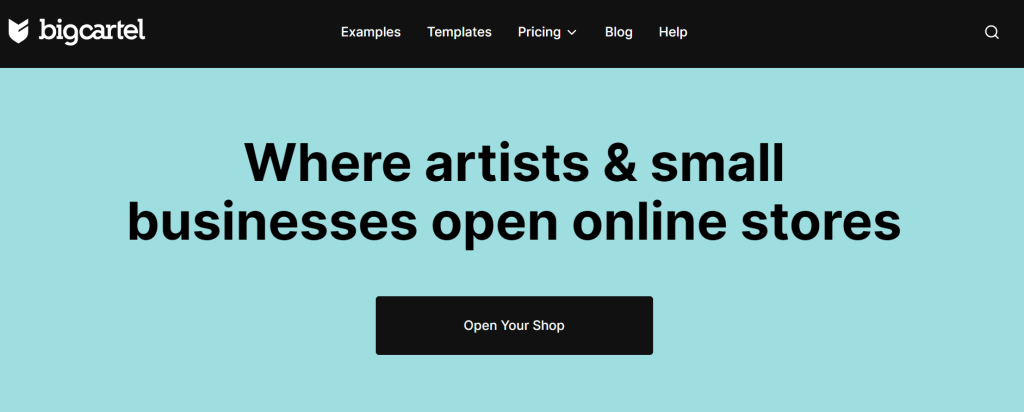
Big Cartel is a WooCommerce alternative tailored for artists, creative freelancers, and small business owners. The setup process is simple, and you can even start selling for free.
To market your products with Big Cartel, simply pick a website template, upload product images, and set the prices. You can access all the templates for free, and they are customizable using the platform’s drag-and-drop editing tool. There’s also a code editor to apply advanced customization to your site’s design.
With the product import feature, you can quickly import your product listings from Etsy. Alternatively, you can also add product files by uploading a CSV file.
As for online payments, Big Cartel supports integration with PayPal and Stripe without charging additional transaction fees.
Big Cartel automatically creates image alt text, incorporates headings, and generates meta descriptions to make your site SEO-friendly. Unfortunately, it doesn’t have built-in blogging features or advanced SEO tools to optimize your site further.
To build a print-on-demand business with Big Cartel, you can integrate third-party services like Printful and Art of Where. These add-ons let you print your artwork on physical products like t-shirts or mugs without the hassle of managing your own inventory.
Price
Big Cartel offers a free plan with decent eCommerce features, such as a real-time sales dashboard, shipment tracking, online payment integrations, and automated tax calculation. However, you can only display up to five product listings with one image for each entry.
The two premium plans cost $12-24/month if billed annually. They let you list up to 50 and 500 products, respectively. You’ll also get premium features, including Google Analytics integration, bulk editing for products, and label printing.
All plans include email and live chat customer support. The highest tier plan will give you top priority support.
Pros
- Bulk product editing. You can set up shipping, change status, edit categories, and delete multiple products in one go.
- Free website themes. All website templates on Big Cartel are available for free.
- Sales tax autopilot. If you sell in US dollars, Big Cartel will automatically calculate sales tax on all orders shipping to or within the United States and Puerto Rico. Otherwise, you’ll need to set up manual tax calculations.
Cons:
- Limited eCommerce features. Compared to other WooCommerce alternatives on this list, Big Cartel is best for building simple online stores.
- No 24/7 support. Big Cartel’s 24-hour support is only available on weekdays. Their support team is available only from 8am to 6pm EST on the weekend.
6. Ecwid

Ecwid is a versatile WooCommerce alternative that can be embedded as a widget into any website. This flexibility and its user-friendly interface make it a popular choice for businesses of varying sizes.
This platform is also available as a WordPress plugin, making it a perfect option for those who want to stay in the WordPress environment.
In addition to websites, users can integrate Ecwid into a sales page on social media platforms and online marketplaces and start selling instantly, including Amazon, eBay, Instagram, and TikTok.
If you don’t have an existing website, you can use Ecwid’s Instant Site feature to set one up. That said, the number of web pages you can create is limited according to your chosen subscription package. For instance, the free plan lets you build a one-page website only.
Ecwid provides digital downloads, product variations, and a multilingual catalog with its paid plans. Purchasing the Unlimited plan also lets you integrate a point-of-sale (POS) system from Square, Clover, or Alice.
Ecwid supports a decent range of payment gateways, including PayPal, Stripe, and Authorize.Net, with no additional transaction fees. The exact availability of payment methods can vary depending on your location.
To enhance your online store’s marketing efforts, Ecwid provides discount coupons, abandoned cart emails, and integration to various ad platforms. If you need more, the Ecwid App Market offers plenty of free and premium add-ons.
You can also request personalized features that aren’t available in the App Market by using Ecwid’s custom development service. Simply describe your ideal online store to Ecwid’s experts, and they’ll build it for you.
Price
Ecwid offers a free plan that includes all the essential features. However, it’s quite restrictive in terms of eCommerce features.
The free plan only allows up to five product listings, and you don’t get inventory tracking, automated tax calculations, or discount functionalities.
To unlock more features, subscribe to the paid plans, which range from $21-89/month for annual payments.
If you want to use Ecwid’s custom development service, you’ll need to pay $200/hour, with a minimum quote of three hours. Purchasing the Business and Unlimited plans, respectively, will grant you a two-hour and six-hour service free of charge.
Regarding customer support, you can only reach the team via email if you’re using the free plan. The premium packages will include additional live chat and phone options.
Pros
- Custom development service availability. You can consult the expert team to help you build an online store.
- Mobile inventory management. By downloading Ecwid’s Sell on the Go app, you can manage inventory from your phone. However, this feature is only available in the Business and Unlimited plans.
- Automated tax calculation. Setting up product taxes is a breeze with Ecwid, as you can enable calculations in a single click. It provides up-to-date tax rates in 16 countries across continents.
Cons
- Higher-tier premium plans are superior. Compared to similar eCommerce solutions, the features included in Ecwid’s lower pricing options are quite limited.
- No 24/7 support. Ecwid’s 24-hour live chat support is only available on weekdays.
7. Shopify

Shopify is another online store builder that offers an intuitive drag-and-drop editor and pre-made templates. If you have an existing WordPress website, you can use the Shopify Buy Button to embed products and provide a seamless checkout process.
This WooCommerce alternative caters to sellers who run omnichannel businesses. For instance, if you want to build a physical store for your online business or wish to participate in pop-ups, Shopify is a great choice.
The Shopify POS feature lets you manage orders, monitor inventory data, and receive payments from multiple store locations in one dashboard. The system syncs all the data in real time, so you don’t have to update it manually.
This eCommerce platform also has an in-house payment processor, Shopify Payments. It has a built-in fraud analysis feature that lowers the risk of chargebacks.
Since Shopify Payments is only available in selected regions, you might have to use a third-party payment gateway, which will charge you an additional transaction fee. The percentage of the fee will depend on your chosen plan.
Shopify has a built-in marketing automation feature that lets you design a customer buying journey. It also provides SEO tools and blogging functionality without relying on third-party apps. If you need more features, the Shopify App Store has thousands of free and premium extensions.
Price
The core Shopify pricing options for building a fully functioning online store cost $29-299/month if billed annually.
You can also use the Shopify POS system separately. The Shopify Starter package costs $5/month and lets you embed products in various online channels. Meanwhile, the Retail package for $89/month enables you to use this feature to sell in both online and physical stores.
Shopify also offers the Plus plan, which is designed for large-scale enterprises. Custom pricing to sign up for this plan starts at $2,300/month for a three-year term.
Every plan includes a 24/7 live chat and email support.
To try out Shopify services, you can use its three-day free trial period and the $1 fee for the first month of your subscription.
Note that all the prices mentioned exclude the additional transaction fees when using payment processors other than Shopify Payments. The rates will depend on your chosen payment provider and the plan you sign up for.
Pros
- Rich in extensions. Shopify offers a rich add-on library compared to WooCommerce and other dedicated eCommerce platforms.
- Omnichannel selling. You can sell products across online and physical stores while tracking product stocks and transactions in one dashboard.
- Built-in fraud analysis feature. Shopify Payments helps detect fraudulent activities to lower the risks of chargebacks.
Cons
- Limited customization. Unlike WooCommerce, Shopify is closed-source software, so most of the store’s customization settings are pre-defined.
- Steep pricing plans. Shopify charges higher than other WooCommerce alternatives, making it less suitable for businesses that prioritize low startup costs.
Torn between Shopify and WooCommerce?
Read our in-depth WooCommerce vs Shopify comparison article.
8. Magento 2
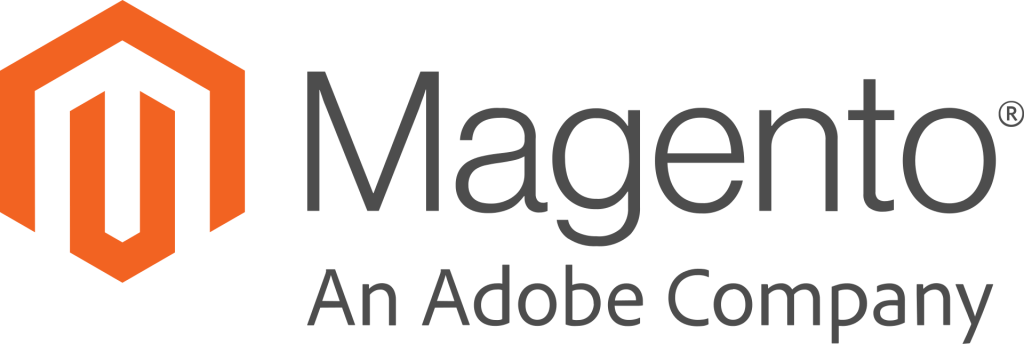
Magento 2 is a free, open-source eCommerce platform for those looking for a highly customizable WooCommerce and WordPress alternative.
Both Magento 2 and WooCommerce offer great flexibility in customizing your online store’s design and functionalities. However, Magento 2’s complex architecture makes it more suitable for advanced users.
With Magento 2, you can control multiple websites and stores from a single dashboard. If you’re working with multiple staff, setting admin roles allows you to restrict confidential information as needed.
This eCommerce platform lets you display physical products with unlimited attributes. If you’re selling downloadable files, you can show product samples. The product grouping and categorization features further enhance the tool’s ability to accommodate online stores with many product types.
As for online payments, Magento 2 supports PayPal, Authorize.net, and Braintree by default. You can also add many more payment options from its rich extensions library.
In terms of marketing features, Magento 2 lets you generate unique coupon codes to use in multiple channels, making it easier to track performance. You can also add various marketing features using extensions or API integrations.
Price
The Magento 2 software license is free. However, like WordPress, you’ll need to purchase a hosting plan and a domain name for your online store.
Since Magento 2 can be resource-intensive, a virtual private server (VPS) is recommended for optimal performance.
Hostinger’s VPS hosting plan starts at £4.99/month. The price includes scalable resources for a medium to large eCommerce website, DDoS protection, free real-time snapshots, and automatic weekly backups.
We provide a streamlined eCommerce setup process using the Magento 2 VPS template. Kodee, our AI assistant tool, is also available to simplify VPS management tasks and troubleshoot server issues.

Other possible expenses for Magento 2 are premium extensions and templates. We’ve covered Magento 2 pricing in more detail if you need further information about these costs.
Pros
- Large user community. You’ll find many resources and forum discussions to help you navigate the tool and connect with experienced users.
- Flexibility and customization options. Magento 2 extensions offer a diverse range of possibilities, with hundreds of free and premium add-ons available to help you design and customise your online business.
- API integrations. In addition to the extensions, advanced users can add store functionalities like CRM, payment gateway, and shipping services with API integrations.
Cons
- Steep learning curve. Due to its complex architecture and wide range of features, Magento 2 requires a steeper learning curve than WooCommerce.
- No direct support. Like WooCommerce, Magento 2 is an open-source eCommerce solution. Therefore, no direct support will be provided.
Thinking of Switching to Magento?
Check out our Magento-related content below
15 Magento Websites to Inspire Your Own eCommerce Website
How to Install Magento 2 Automatically and Manually
Magento 2 Tutorial: Building a Large-Scale eCommerce Site
When should you consider a WooCommerce alternative?
We understand that WooCommerce is not the perfect match for every business. If you experience any of the following, it might be time to consider an alternative to WooCommerce:
Limited technical knowledge or time resources
WooCommerce requires a basic understanding of WordPress, and its open-source nature creates a steeper learning curve.
If you lack technical expertise in WordPress and PHP, it may take longer to master WooCommerce and maximize all its notable features.
Moreover, setting up a WooCommerce store can be time-consuming. If you prioritize speed to market, a hosted platform like Hostinger Website Builder can be a better option.
Complex online store features
Organizing thousands of products into logical categories and tracking stock levels can be complex with WooCommerce. Therefore, platforms with an advanced POS system will be more suitable for managing large product catalogs.
The more complex website features you want, the more extensions you need to add to WooCommerce – some of them paid. WooCommerce alternatives may provide a more comprehensive suite of features built into the tool.
Specialized product types
If you only want to sell a specific product type, like digital products, a WooCommerce alternative that offers features tailored to that product type can better serve your needs.
Technically, you can sell a wide range of products on WooCommerce. However, you may need to install extensions to integrate features like memberships and subscriptions.
How to choose the best WooCommerce alternative
A solid business plan is the key to deciding whether you need to use WooCommerce or one of its alternatives.
It lets you map out the essentials, including the start-up cost, target audience, types of products, business model, and marketing strategies, before launching your online store.
Once you know your business needs and priorities, list the pros and cons of each eCommerce platform by considering these factors:
Customizability
Building a website with a content management system (CMS) like WordPress or Magento gives you code-level control over your website. This makes CMSs attractive to people with sufficient technical knowledge or those with the means to hire a web developer.
The good news is that CMSs have extensive community support, so there are plenty of learning resources and discussion forums to help you master it.
Meanwhile, ready-to-use eCommerce platforms like Hostinger Website Builder are a better option for beginners and those who want to launch their business quickly and don’t mind less flexibility.
Many WooCommerce alternatives also offer personalized plans for large-scale enterprises, which can be costly.
Suggested Reading
Learn more about how WordPress differs from website builders to help you come up with an informed decision.
Payment solutions
Payment options influence customers’ buying decisions. Choose payment gateways that can fulfill your target market’s preferred methods and your business’s specific needs.
At the very least, your chosen eCommerce platform should integrate with popular payment gateways catering to a wide range of customer preferences. Support for multiple currencies and regional payment methods is equally important if your business operates internationally.
Don’t forget to choose a platform that adheres to PCI DSS compliance standards to minimize security vulnerabilities.
Customer support
Smooth business operations hinge on quality customer support from your eCommerce platform. Reliable and knowledgeable customer support will help you streamline store setup and quickly resolve errors.
Open-source platforms like WordPress and Magento lack direct customer support. However, reliable customer support is often a key selling point for hosted eCommerce solutions like Hostinger Website Builder.
Quick response times and competence are equally important when it comes to customer support. Thoroughly evaluate each platform’s reviews to assess its ability to help its customers and resolve issues promptly.
Prioritize platforms that provide multiple support channels, including live chat, email, phone, and an extensive knowledge base. In addition, 24/7 availability is crucial for businesses with a global customer base across different time zones.
Additional features and third-party integrations
Having the option to add extra features in addition to basic eCommerce functionality can help streamline store management and provide the best user experience.
From shipping and fulfillment to marketing and customer relationship management (CRM) integrations, add-ons can automate tasks, improve efficiency, and provide valuable insights for better business decision-making.
Make a list of the essential sales and marketing features you want to have on your site. Then, make sure your chosen platform has them or provides integration with relevant third-party apps.
Furthermore, access to robust SEO tools is crucial to boost your store’s visibility, which can eventually increase sales conversions. Therefore, prioritize eCommerce platforms that make editing meta tags, creating a sitemap, and writing clean URLs much easier.
A blog can also make your website more SEO-friendly, as it lets you distribute keywords across web pages. If you want to incorporate content marketing strategies into your business, look for a platform that offers a decent blogging feature.
Value for money
Carefully weigh each WooCommerce alternative’s cost against the benefits it provides to your business.
Estimate the possible expenses by considering the cost of the platform, additional fees for payment processing, transaction charges, and any required costs for additional features.
Then, assess the potential return on investment (ROI) by considering the platform’s ability to increase sales, improve efficiency, and reduce operational costs. Avoid spending any budget on features that don’t add value to your business.
Finally, evaluate the platform’s scalability for the long term. Aim for a platform that can grow with your business without incurring significant additional expenses.
Conclusion
Choosing the right eCommerce platform is a pivotal decision for any online business. While WooCommerce has proven to be a popular choice, the alternatives explored in this article offer a diverse range of features, pricing models, and target audiences:
- Easy Digital Downloads – best for selling digital products on WordPress websites.
- MemberPress – best for building membership WordPress websites.
- WP EasyCart – best for small to medium WordPress-based online stores.
- Hostinger Website Builder – best for small to medium business owners looking for an easy eCommerce website creation tool.
- Big Cartel – best for art creators and small businesses.
- Ecwid – best for embedding products on an existing website or social media account.
- Shopify – best for selling products in multiple channels.
- Magento 2 – best for tech-savvy users to build medium-to-large-scale online stores.
Carefully weigh each platform’s pros and cons to find one that best aligns with your business needs and goals. We also recommend taking advantage of free trials, demos, and money-back guarantees to get firsthand experience with each platform.
We hope this article helps you choose the best WooCommerce alternative for your business. Good luck!
WooCommerce alternatives FAQ
Is there a better WordPress eCommerce plugin than WooCommerce?
So far, WooCommerce still has the most comprehensive features for selling various types of products on WordPress. However, other eCommerce plugins like Easy Digital Downloads and WP EasyCart also have their own strengths. Choose the one that best fits your business needs and offers the most value for money.
What are the disadvantages of WooCommerce?
Compared to hosted eCommerce platforms, WooCommerce requires a steeper learning curve, lacks direct customer support, and can be prone to WordPress’ security vulnerabilities.
Is WooCommerce still relevant in 2025?
Absolutely. WooCommerce offers unmatched flexibility and low startup costs for building an online store of any size. The number of online stores created with WooCommerce exceeded 4.7 million in 2025, proving the plugin’s relevance as a robust eCommerce platform.


